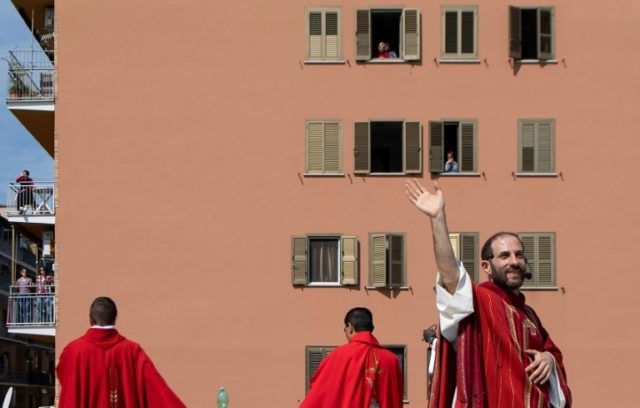
Rome (AFP) – Italian officials said Sunday they may soon have to consider easing restrictions after seeing the daily coronavirus death toll plunge to its lowest in over two weeks.
The 525 official COVID-19 fatalities reported by the civil protection service was the Mediterranean country’s lowest toll since 427 deaths were registered on March 19.
They also represented a decline of 23 percent from the 681 deaths reported on Saturday.
“The curve has started its descent and the number of deaths has started to drop,” Italy’s ISS national health institute director Silvio Brusaferro told reporters.
“If these data are confirmed (in the coming days), we will have to start thinking about Phase 2,” he said in reference to an easing of a month-long national lockdown.
Unchartered waters
Italy’s second phase of the battle against a virus that has now officially killed 15,887 may be trickier for the government to pull off than the first.
Prime Minister Giuseppe Conte decided to address Italy’s biggest crisis in many generations by sacrificing the economy for the benefit of the health care system.
The nation of 60 million became first the Western democracy to voluntarily shut down almost all businesses and ban public gatherings — including simple walks in the park — on March 12.
His gamble appears to be paying off.
Officials reported the first decline Sunday in the number of non-critical COVID-19 patients receiving hospital care across the country’s 22 regions.
That number fell from 29,010 on Saturday to 28,949 on Sunday.
The number of critical patients edged down from 3,994 on Saturday to 3,977 on Sunday — the second successive decline.
But the hit to the Italian economy will be massive.
The country’s big business lobby Confindustria estimates that this year’s production will shrink by six percent if the lockdown remains in place until the end of May.
Confindustria believes that any additional week after that will chop another 0.75 percent off Italy’s total output — the European Union’s third-largest last year.
The second phase of Italy’s battle against the pandemic represents an easing that no Western nation has tried since the virus spread from China to Europe in February.
Italian health officials remain extremely cautious because they know that the death toll is falling almost certainly because everyone is spending almost all their time at home.
Civil protection service chief Angelo Borrelli called Sunday’s drop in reported deaths “good news.
“But we should not let our guard down,” he warned.
Five-point plan
Italian media on Sunday said Conte’s government was preparing a five-point plan that would open up businesses in stages and keep many of the social distancing measures in place for some time.
Corriere della Sera daily said Italians would be asked to go to work with facemasks and required to stay two metres (six feet) apart in public at all times.
Anyone who shows the slightest COVID-19 symptoms must be immediately reported to the health authorities and isolated for two weeks.
Italy is also reportedly planning to build more coronavirus-specific hospitals across the country.
Conte’s government also intends to secure tens of thousands of certified blood test kits to see how many people have developed antibodies for the disease.
Those with the antibodies might have immunity and be allowed to work.
But Italy does not have any certified kits at the moment and when these will be available remains unknown.
It is also unclear whether people with antibodies can still spread the disease.
The government’s final proposal involves using phone apps to “strengthen contract tracing” — a controversial measure that has been tried in countries such as South Korea and Israel.
Privacy advocates say it violates many social norms that Western governments had followed before the pandemic broke out.

